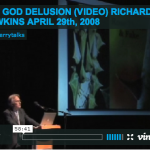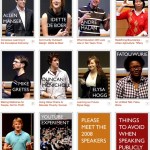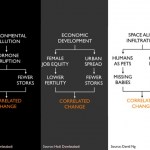
A few months back I had a chance to be involved with Dawkins' visit to Vancouver, and here we had a chance to record his speech. Not a bad way to spend an hour on this particular day.
Actually, Richard's presentation is very good (quite humourous at times) and definitely worth checking out. Click on the image below which should transport you to an enabled video site (the actual movie is protected to only play at terry.ubc.ca).
I've got a humour piece at McSweeney's today in celebration of Darwin's 200th. Here's a snippet:
Joins the Ice Capades: Darwin is hired for small part in a Lion King-themed ice show. Takes skating lessons and practices hard. Soon nails both the triple axel and the triple lutz. Is fired from the show when he tests positive for performance-enhancing drugs.
My favourite bit is actually the part about losing his mind, and you can read the rest at McSweeney's and maybe (if you're so inclined) try to come up with a few yourself in the comments below.
(Given it being a big week for Darwin and all, I thought it would be kind of cool to repost this post from 07)
Not counting Shouts and Murmurs email queries, I've sent pieces to the New Yorker proper on three occasions, the last of which just a few months ago. What I've noticed is that there is a clear trend is how these rejection letters have been developing over the years.
Here's the first one I got, which I think is pretty impressive and earned a rating of "A" in a previous post. I mean, it's got it all. Handwritten, reference to a powerful editor at the top of his game, written and…
(Earlier the video had server issues, so just reposting - this video is really worth checking out)
If you haven't heard of the Universities Allied for Essential Medicines (or UAEM), then put it on your to do list right now. Better yet, sit yourself down and watch Mike Gretes in this video for 20 minutes.
Making medicines for people, not for profit: Mike Gretes from terrytalks on Vimeo.
- - -
Basically, this is one of many great student talks, I've got going up on our Terry talks site, but this one in particular I think is particularly relevant for those within the ScienceBlog readership,…
If you recall, a while back we held a TED talk like event but with students front and centre. We called it Terry talks in concert with another project I'm involved with at UBC. In any event, all the student talks are now available for viewing (a la me figuring out how to use Final Cut).
Click here to go to the site, and then if you have a moment leave a comment or two here or there, it doesn't matter, but I'm curious what you think generally.
Just finished producing the last of the Terry talks videos, and will hopefully have all 9 up by the end of today. Having the chance to view all of them lately has really hit home for me that there are some amazing students out there.
Anyway, kind of reminded me of this poem by Mary Oliver:
SONG OF THE BUILDERS
On a summer morning
I sat down
on a hillside
to think about God-
a worthy pastime.
Near me, I saw a single cricket;
it was moving the grains of the hillside
this way and that way.
How great was its energy,
how humble its effort.
Let us hope
it will always be like this,
each of us going…
In The Landscape of History, John Lewis Gaddis writes about the difference between reductionist research methods and ecological ones. Gaddis is a well-known and influential Cold War historian at Yale. This accessible and undergrad-suitable book is a brief foray into historiography and the practice of the historian's craft. His discussion of research methods comes along as he questions the social scientists' premise that one can separate dependent from independent variables, that one could hold all variables constant and look to just one to explain the rest. But all variables are…
This is a follow-up to a post a few weeks back about the One Laptop Per Child program. I had offered that post by way of summary to a class exercise about technology in cultural context. In part, it was an exercise about discussing the place of technology in global development efforts; at the same time it was an effort to take the history of technology discussions we'd been having and place them into a kind of global history context. For example, we needed to see more of the prior history of Western aid in the non-western world--the patterns of high modernist development, environmental…
Beautifully done. I wish I could prepare lectures like this...
Just curious - the other day I gave a talk on the scientific method, and I was going over some of the icons that shaped the principles behind how science is done (like Francis Bacon, Thomas Hobbes, and good old Karl Popper).
I actually tried to paint a bit of a picture by imagining going for drinks with these three fellows, having read that Bacon was a bit of a know-it-all, Hobbes could be quite brash, and that Popper was very much about helping others (a socialist through and through). I thought those three would make the perfect "drinking buddy" companions.
And then, a grad student said…
Here's a slide I recently made in a lecture on the scientific method, to illustrate how easy it is to produce very different hypotheses for a particular observation.
Basically, the backdrop was to consider a scenario where environmentalists had noticed a significant drop in stork population, and also where the government recording its national birthrate dropping significantly (this apparently happened in China in the 80s, although the use of these two observations works nicely because there's also a well known folktale link between storks and babies). Building from a visual that Hadi…
Example #2,724: Ronald Bailey, "The Food Miles Mistake," in Reason Magazine. As readers of this site know, we've weighed in numerous times of the Food Miles issue. Among the great many cases of public environmental debate that require a move beyond superficial parlor talk, the agriculture-energy connection has been an area of particular interest here.
(image from the BBC)
In this recent article, from last November, Bailey uses flawed assumptions, undeveloped concepts, and weak historical awareness to guide a column.
"Thank you for the disingenuous article," writes one reader, which I…
For those of you at this year's Terry talks, you'll obviously be aware of our little YouTube experiment. In any event, I present to you the fruit of that labour below.
If you weren't at the conference, here is the gist: audience members were ask to participate by brainstorming, pitching, choosing, and then executing an activity amenable to recording via YouTube. This was done during the odd free 5 minutes here and there in the conference program. In total I think about 20 minutes in all was used to get the material for the video.
Big thank you to the all involved, and related to this (…
The genre of "environmental documentary" or "environmental film" is large enough now that it can suitably hold sub-sets. Here is a start to a filmography of agro-environmental documentaries and films. Since it is by no means exhaustive, I welcome all additions. I should say too that although many of these almost necessarily touch on GMOs and biotechnology in general, I am looking more for ones that put the lens on alternative and sustainable agriculture as their centerpiece.
Princeton's Environmental Film Festival (currently underway), is hosting some of these agro-food films, along with…
New research shows links between marshmallow melting and pediatric nutrition.
Perhaps.
Yes, in homage to the Gladwellian oeuvre and generic New Yorker-ese please find "I Dream in Malcolm Gladwell" at The Morning News. We do encourage you to check it out.
They are cultural, philosophical, and political.
Not even John Lennon can overcome the flaws, given their deep cultural basis.
Nicholas Negroponte, co-founder and director of the MIT Media Laboratory, introduced the idea for the $100 laptop in 2005. The laptop would be geared towards children in "developing nations." Its intent was to help education in those countries. The project's goal, to be specific, is "To provide children around the world with new opportunities to explore, experiment and express themselves." The technical accomplishments of the laptop project were swift--low power…
Two outstanding and influential thinkers and writers, Wendell Berry and Wes Jackson, contributed an op-ed to the Times yesterday. More or less, here's the gist:
[W]e...need a national agricultural policy that is based upon ecological principles. We need a 50-year farm bill that addresses forthrightly the problems of soil loss and degradation, toxic pollution, fossil-fuel dependency and the destruction of rural communities.
They argue that a farm bill needs to envision decades, not years, in its scope, so as to accommodate and accept the ecological dynamics of agricultural landscapes. They…
This poem was sent along by W.J. Galusky, occasional guest contributor to the site. One nice thing is that it's worth reading, as below, but also worth listening to someone reading it, as at this site.
The poem is by Sarah Lindsay. It is from her book, Primate Behavior (1997).
Cheese Penguin
The world is large and full of ice;
it is hard to amaze. Its attention
may take the form of sea leopards.
That much any penguin knows
that staggers onto Cape Royds in the spring.
They bark, they bow one to another,
she swans forward, he walks on her back,
they get on with it. Later
he assumes his post,…
For the new year, in the winter's gray, here are three pictures of summer color past.
Happy new year.
Yes indeedy - the answer is... "The Tempest!"
Which is to say, you pretty much got it from the last few PF3 related posts. But here's the full lowdown on how the images were initially chosen.
Clue #1:
(strange orbital looking thing). This is actually an image I found from a physicist/artist website - which I must confess, I can't seem to find again - that depicts the modeled path of the planets as viewed from Uranus looking towards the Sun. This is what the asterisk + eyeball doodle was suppose to suggest anyway.
From here, Uranus was suppose to be a single degree of separation from The…


